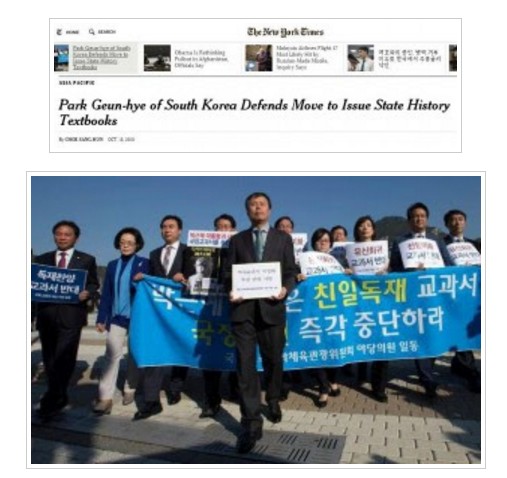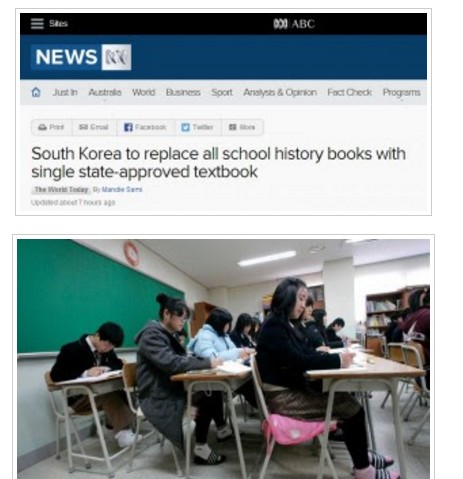호주 ABC “교과서 통제, 北에서나 볼 수 있는 퇴행적 움직임”
박근혜 정부가 역사교과서 국정화를 강행하고 있는 가운데 외신들도 이 같은 국내 상황을 비중있게 타전하고 있다.

뉴욕타임즈(이하 NYT)는 지난 13일 “Park Geun-hye of South Korea Defends Move to Issue State History Textbooks-한국 박근혜, 국정 역사교과서 추진 옹호”라는 제목의 아시아판 기사를 통해 박근혜 정부가 “한국이 외세에 점령되는 것을 막기 위해” 국정 역사교과서를 채택했다고 보도했다.
기사는 야권을 비롯해 각계 시민사회의 다양한 반대 의견에도 박근혜 대통령이 국정 역사교과서 채택의지를 강하게 보였다고 전했다.
그러면서 “아베 정부가 교과서를 이용해 일본의 근대 식민 역사에 대한 은폐와 점점 심해지는 국수주의적 시각으로 일본 청년들을 세뇌시키고 있다고 수차례 비난해온 박근혜 정부가 한국 내 비판가들로부터 유사한 비난에 직면하게 됐다”고 지적했다.
기사는 또 “2013년에 보수 학자들이 대안 교과서를 출간했다”고 전하면서 “그러나 그 교과서는 친일 식민주의자들의 과거를 축소해 기술하고 박정희의 업적은 과장했다는 비난을 받았으며, 그 교과서를 채택한 학교는 거의 없었다”고 설명했다.
| 다음은 뉴스프로가 번역한 NYT 기사 전문 번역 감수: 임옥 Park Geun-hye of South Korea Defends Move to Issue State History Textbooks SEOUL, South Korea — President Park Geun-hye on Tuesday defended her government’s decision to teach children history with government-issued textbooks, arguing that the move was aimed partly at preventing the country from ever again being dominated by a foreign power. “We are witnessing a rapid shift in Northeast Asia and its vicinity,” Ms. Park said in her first reaction to a political firestorm ignited by the government announcement on Monday. “Given the situation, if we don’t try to inculcate the students with historical convictions and pride, we may be culturally and historically subjugated by another country.” Ms. Park made the comment in a meeting with her senior presidential staff, according to her office, hours before leaving for the United States for a summit meeting with President Obama. The two leaders are expected to discuss South Korea’s increasingly tricky balancing act between the United States, its biggest military ally, and China, its main trading partner. Last month, Ms. Park was the only leader from a major American ally to attend a military parade in Beijing that highlighted China’s growing quest for military influence in the region. Ms. Park has met President Xi Jinping of China several times while shunning Prime Minister Shinzo Abe of Japan, another crucial American ally. Under Ms. Park, South Korea has repeatedly accused Mr. Abe’s government of using textbooks to indoctrinate young Japanese with a whitewashed and increasingly nationalistic version of its modern colonialist history. But she faced similar accusations of propagandism from her domestic critics after her government decided to place itself in charge of writing history textbooks for middle and high school students. On Tuesday, the main political opposition warned of a major legislative gridlock, threatening to block budgetary and other bills at the National Assembly unless the government withdrew the decision. Many history professors said they would not accept the offer even if the Education Ministry invited them to join a panel of historians that the government said would write new textbooks. In a message widely circulated online, Moon Jae-in, the main opposition leader, targeted Ms. Park when he said, “A good president makes history, a bad president makes history books.” Ms. Park’s opponents feared that Ms. Park would use the new textbooks to gloss over the legacy of the country’s conservative elites, including her father, the former military dictator Park Chung-hee. Many conservative former leaders, like Mr. Park, were accused of collaborating during Japan’s colonial rule of Korea in the early 20th century. They subsequently led South Korea during its rapid economic growth but also jailed and tortured dissidents, branding them Communists. On Tuesday, Ms. Park showed no sign of backing down. “History education should never be used for political strife or ideological confrontation to divide the people and the students,” she said, accusing the opposition parties of stoking “unnecessary controversy.” She said her government was trying to arm young Koreans with “correct historical views and values.” Currently, schools are free to choose from among eight history textbooks, distributed by private publishers after the government approved them. But Ms. Park and her conservative supporters faulted the books, saying they were written by left-leaning historians and teachers with “ideological biases.” In 2013, conservative scholars published a rival textbook. But it was accused of playing down the legacy of pro-Japanese collaborators and exaggerating the achievements of Mr. Park, and few schools have adopted it. |
그런가하면 같은날 호주 공영방송 ABC는 호주 국립대학 전략과 국방 연구센터 객원 연구원인 엠마 캠벨 박사의 인터뷰를 통해 단일 국정 역사교과서의 추진이 무모하고 위험스러운 일임을 지적했다.

엠마 캠벨 박사는 “북한을 포함해 교과서를 엄격하게 통제하는 몇몇 나라들을 볼 때 그것이 매우 퇴행적인 움직임이라고 보는 한국의 많은 사람들이 나와 뜻을 같이 한다고 생각한다”면서 “다양성과 민주주의, 그리고 표현의 자유를 고무시켜야 할 나라가 이런 방향으로 가고 있다는 사실이 실망스럽고 의외”라고 말했다.
캠벨 박사는 역사교육 방법을 통제하려는 박근혜 정부의 움직임은 한국내 정치적 문제들과 연관된 것으로 본다고 밝혔다.
그는 “현 정부는 우익이고, 현직 대통령은 독재자 박정희의 딸 박근혜”라면서 “그녀가 이끄는 정당과 정부의 많은 사람들이 1987년까지 한국을 통치한 독재 정권과 깊은 관계를 맺고 있다”고 설명했다.
이어 “이 보수 정권 내부에는 그 시대의 성과와 또한 당시 역사 속에서의 자신들의 역할, 그리고 자기네 정당의 역할이 보다 긍정적으로 반영되도록 당시 역사가 어떻게 보여지는지를 통제하고자 하는 욕구가 있다고 생각한다”고 덧붙였다.
| 다음은 뉴스프로가 번역한 ABC 기사 전문 번역 감수: 임옥 South Korea to replace all school history books with single state-approved textbook South Korea’s government has announced a controversial plan to replace a variety of history books with a single textbook approved by the state. Currently high schools can choose from books released by eight different publishing companies, but the government said those were all too left-wing. By 2017, The Correct History Textbook will be the only history book allowed in South Korea’s high schools. It will be written by a government-appointed panel of history teachers and academics. Opposition politicians and some students have already been protesting against the move, accusing the government of “distorting history”. Dr Emma Campbell, a visiting fellow at the Australian National University’s Strategic and Defence Studies Centre, said the move was unexpected and disappointing. “I think I’m joined by quite a lot of people in South Korea who think it’s quite a regressive move, especially when you look at the few countries who have such tight control of the textbooks, which include North Korea,” she said. “So I think it’s a disappointing and surprising move by a country that really should be encouraging diversity and democracy and freedom of speech.” Dr Campbell said she believed the move to control how history is taught was related to domestic political issues in South Korea. “The current government is from the right and its leader and Korea’s current president is Park Geun-hye, who is the daughter of the former authoritarian dictator of South Korea Park Chung-hee, and many people in her party and in the current government have ties to the previous authoritarian regime that ran Korea until 1987,” she said. “And I think there is a desire within the right wing government to control the presentation of that history in order to perhaps reflect more positively on the achievements during that time and also their role and the role of their party in that history.” Dr Campbell said the textbook could bolster opposition and anger toward an already unpopular government. “It will be interesting to see how the government responds to that strength of opposition,” she said. “One hopes that it will encourage them to review their decision about creating one single textbook.” South Korea not the first to control how history is taught Educationalist Michael Dunn told the BBC South Korea was not alone, with school history lessons causing controversy in Western countries like the United States and United Kingdom. “I think the Americans have a constant running battle between liberals and more conservatives about how they should present their past,” he said. “One side would like to present a glorious history of the American past – in their view this makes the country a happier place. “On the other hand, the liberals in the United States are much keener to present perhaps a more social view of the past and give a voice to people who have been oppressed. “I think also the UK have a very interesting approach. We tend to avoid controversial history in our curriculum, we’re very keen on looking at more distant history and somehow, for some reason the less controversial it becomes. “But there are very few younger students in our school who will be able to tell you about British involvement in, for example, the Iranian coup d’état or how we handled the Suez crisis which was certainly not the most glorious points in our history.” Mr Dunn warned that the censorship of history was dangerous. “History just provides us with vital skills,” he said. “I personally believe that the skills involved in history – that is, empathising with the past, understanding what made people do the things that they did – that is what makes history such an important thing to study.” |


